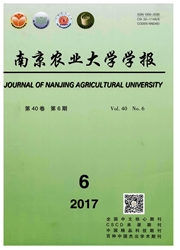

 中文摘要:
中文摘要:
为探究外源肌醇对水稻幼苗抗寒性的影响,本试验共分为4个处理,即常温对照、常温肌醇组、低温对照和低温肌醇组,研究肌醇处理下水稻幼苗生长及生理生化指标的变化。结果显示:常温对照和常温肌醇组的水稻幼苗过氧化氢酶(CAT)活性、超氧化物歧化酶(SOD)活性、过氧化物酶(POD)活性、丙二醛(MDA)含量、过氧化氢(H2O2)含量、株高和鲜质量间差异均不明显。低温对照和低温肌醇组的水稻幼苗CAT活性、SOD活性、POD活性、株高和鲜质量均显著低于常温对照和常温肌醇组,而MDA和H2O2含量均明显升高;低温肌醇组水稻幼苗CAT活性、SOD活性、POD活性和鲜质量均显著高于低温对照,而MDA和H2O2含量均显著低于低温对照。
 英文摘要:
英文摘要:
To study the effect of inositol on cold resistance of rice seedlings,four treatments,including water(control) and inositol treatment at normal temperature,control and inositol treatment at low temperature were set,and differences in growth,physiological and biochemical indexes of rice seedlings exposed to inositol were compared.The difference was not significant in CAT,SOD and POD activities,methane dicarboxylic aldehyde(MDA) and hydrogen peroxide contents,height and fresh weight of rice seedlings in control and inositol treatments at normal temperature.Under low temperature stress,CAT,SOD and POD activities and height and fresh weight of rice seedlings declined greatly,while MDA and hydrogen peroxide contents increased significantly.The CAT,SOD and POD activities and fresh weight of seedlings exposed to inositol at low temperature were higher than those in control treatment at normal temperature,while MDA and hydrogen peroxide contents were lower.
 同期刊论文项目
同期刊论文项目
 同项目期刊论文
同项目期刊论文
 期刊信息
期刊信息
